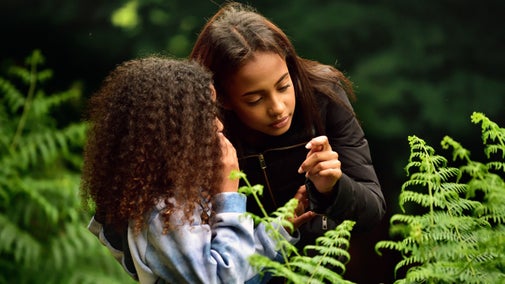
Donate
Everyone needs nature, now more than ever. Donate today and you could help people and nature to thrive at the places we care for.

Common juniper is one of only three conifers occurring naturally in the UK. It’s also a characteristic shrub of uplands, especially in limestone areas, and is particularly valued for its berries used to flavour gin. However, wild juniper has been in decline for decades and is now also under acute threat from a root disease caused by fungal pathogen Phytophthora austrocedri. Find out how we’re saving the shrub at Compton Down.
Compton Down, a Special Area of Conservation and a Site of Special Scientific Interest, is owned and managed by the National Trust.
It’s one of the two last refuges of juniper in Dorset and was believed to be home to the last male juniper plant in the county.
Without action to boost the numbers of plants, the species is likely to disappear from this and other sites.
To help the junipers along, Area Ranger for North Dorset, Clive Whitbourn, has been working with partners including Plantlife, Animal and Plant Health Agency (Defra) and Natural England to protect and regenerate the sites at Compton Down (part of Fontmell and Melbury Downs).
Clive says: ‘Back in August 2010, after discussing the project with the charity Plantlife, I took some cuttings from the last male plant, packaged them up carefully following the very precise instructions and, with a funny look and inquisitive comment from the local postmistress, I sent them down to Devon.
‘There, Nursery Manager Chris Trimmer took care of the cuttings and raised them at our state-of-the-art Plant Conservation Centre (PCC). This was part of a joint project with Plantlife and their juniper project.
‘Because of the restrictions on planting out wild juniper, the project was delayed until recently when I was able to gain permissions from the Animal and Plant Health Agency and Natural England respectively.’

Another 150 Juniper cuttings were also taken from a nearby location in Wiltshire and sent to the PCC for propagation by Plantlife and it’s this partnership which has enabled the genetic mix to take place with 20 plants (male and female) grown to go back out into the wild.
Dr Trevor Dines, Botanical Specialist at Plantlife, said: 'It's fantastic not just to see these junipers returning to Dorset, where they've been known for generations, but to also know that they come with a firm bill of health.
‘I've seen the devastation wrought by Phytophthora austrocedri on wild juniper, with whole bushes turning brown and dying. It's a nasty little thing, originally introduced through the nursery trade, so we can be confident our nice clean plants have the best of starts.'
Simon Curson, one of Natural England's lead ecologists for the Dorset and Hampshire area, said: 'This is a brilliant example of how the National Trust is working to enhance the biodiversity of Dorset. Some invertebrates, such as juniper carpet moth and juniper pug moth, will only use juniper to live on.
‘So, as well as adding to the diversity of plant species at Compton Down, it is hoped that increasing the population of junipers there will give a boost to the overall biodiversity of the site.
‘It is wonderful to see work like this taking place and Natural England are thrilled at the prospect of juniper stands becoming established at Compton Down once more.'

The PCC is where rare and valuable plants from National Trust sites all over the country are conserved through propagation and distribution.
Skilled propagation and meticulous standards of biosecurity and hygiene have helped ensure that the young junipers have remained disease-free and are now ready to be planted back into the wild over the winter.
This will help ensure that juniper remains a feature of this landscape, and will be a relief for gin drinkers everywhere.
With your ongoing support, we're able to continue our vital conservation work. Thank you for helping to protect these special places.

Everyone needs nature, now more than ever. Donate today and you could help people and nature to thrive at the places we care for.

Plantlife is a British conservation charity working nationally and internationally to save threatened wild flowers, plants and fungi.

Natural England is the government’s adviser for the natural environment in England. They help to protect and restore our natural world.

Fontmell and Melbury Downs in Dorset is a landscape for all seasons. Discover the array of wildlife and archaeological features to explore.

The Forest School at Fontmell Down is a private woodland hired out exclusively for the use of schools and community groups. Find out more about the learning experience on offer.

Find out where you can walk your dog on Fontwell Down, an area of natural beauty with views across Blackmore Vale, and the things to be aware of when you visit.

We believe that nature, beauty and history are for everyone. That’s why we’re supporting wildlife, protecting historic sites and more. Find out about our work.

Read about our strategy, which focuses on restoring nature, ending unequal access and inspiring more people.